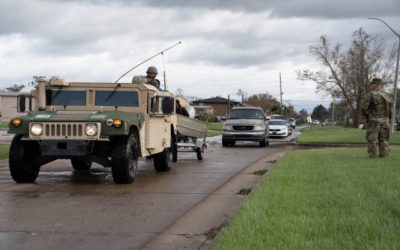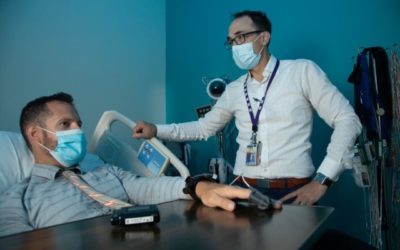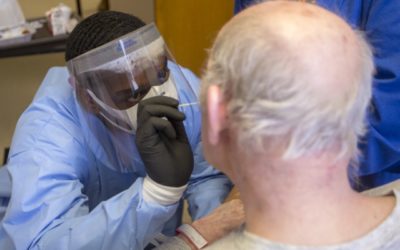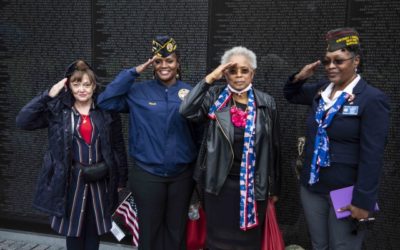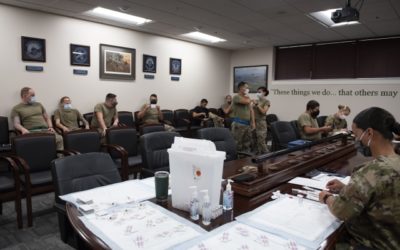Telemedicine offers convenient healthcare for many, but those who could stand to benefit most could be the least able to access it, according to a new analysis.
Deprescribing BP Medications in Older, Frail Patients Can Be Right Thing to Do
Growing evidence from observational studies signals that prescribing multiple antihypertensive prescriptions might do more harm than good in older patients with polypharmacy and comorbid conditions.
PTSD Medications Change Over Time in VHA
What medications tend to be prescribed for veterans diagnosed with post-traumatic stress disorder, and how has that changed over time?
Somatic Symptom Disorder Ups PTSD Risk
In somatic symptom disorder, patients develop too much focus on physical symptoms, such as pain, weakness or shortness of breath, which causes them significant distress and often creates problems for normal function, according to the American Psychiatric Association.
LAIs Improve VHA Schizophrenia Medication Adherence
Ensuring high rates of medication adherence is one of the greatest challenges in treating schizophrenia patients at the VA and elsewhere.
COVID-19 Pandemic Provides Lessons on Protecting VA LTC Facilities
The VA can learn important lessons from how it handled infection control in its senior centers during the height of the COVID-19 pandemic, according to a recent Government Accountability Office (GAO) report.
Why Gay, Lesbian and Bisexual Vietnam Veterans Suffer More From PTSD
Lesbian, gay and bisexual veterans who served in the Vietnam era reported more post-traumatic stress disorder and other mental health issues than their heterosexual counterparts, and a new analysis of data from a nationwide study survey questioned whether that was related to past trauma related to sexual identity.
National Guard Responds to Hurricane Ida Catastrophe
As of the end of August, the National Guard had activated more than 5,200 personnel in Louisiana, Mississippi, Texas and Alabama in response to Hurricane Ida, according to Army Maj. Gen. William D. “Hank” Taylor, the Joint Staff deputy director for regional operations.
Insomnia Has Affected Nearly 1 in 5 Veterans During the Pandemic
Sleep is essential to mental and physical well-being, and not getting enough sleep can lead to stress or difficulties concentrating, solving problems—even fighting off infection. At the same time, stress and anxiety can also lead to disrupted sleep.
Benefit Found for Testing Veterans With Hepatitis B for Liver Cancer
The most common risk factors worldwide for liver cancer are chronic infection with hepatitis B virus or hepatitis C virus, according to the American Cancer Society.
Risk of Acute Liver Injury Found to Be Low With Hepatitis C ‘Cure’
More than 5% of U.S. veterans are infected with chronic hepatitis C (HCV)—roughly triple the rate of the general population, with the percentage, 10%, even higher among those born between 1945 and 1965.
Study Describes the Success of the VA’s Hepatic Innovation Team Collaborative
Hepatitis C can lead to serious liver diseases including cirrhosis and liver cancer—particularly hepatocellular carcinoma, which accounts for about 90% of all liver cancer cases.
NAFLD Is Dramatically Growing as a Cause of Hepatocellular Carcinoma
The worldwide prevalence of nonalcoholic fatty liver disease-related hepatocellular carcinoma is expected to increase in line with the growing obesity epidemic.
Hepatocellular Carcinoma Diagnosis Delays Common for Veterans With Cirrhosis
What factors are behind delays in diagnosis of hepatocellular carcinoma in veterans who have cirrhosis of the liver?
Nasopharyngeal Swabs Superior for Diagnosing SARS-COV-2 Infection
Identifying SARS-CoV-2 infections quickly and accurately is critical to managing the COVID-19 pandemic and reducing community spread of the virus.
Veterans’ Diseases Presumed to Be Linked to Agent Orange Exposure
VA has recognized certain cancers and other health problems as presumptive diseases associated with exposure to Agent Orange or other herbicides during military service. Veterans and their survivors may be eligible for benefits for these diseases.
Aging Baby Boomers Will Require VA to Double Long-Term Care Spending
As the baby boomer generation begins to reach the age where they will require regular, long-term care, VA will be required to shift a huge portion of its resources to care for them.
VA Begins Processing Claims for New Conditions Related to Agent Orange
Last month, VA began processing disability claims for asthma, rhinitis and sinusitis on a presumptive basis for veterans who served in southwest Asia and some other areas.
The 22nd and Last Kandahar Rotation
The Role 3 Multinational Medical Unit at Kandahar Air Field in Afghanistan has been a world-class trauma hospital staffed by medical professionals from the United States and six other countries: Canada, the Netherlands, Denmark, the UK, New Zealand and Australia.
Unexpected Results Revealed No Boost in Veteran Suicide Rate During Pandemic
Past research has suggested that suicide rates rose during the 2018 influenza epidemic—unrelated to World War I and Prohibition—and during the 2003 severe acute respiratory syndrome outbreak among older adults in Hong Kong.
Military, VA, Other Federal Medicine Agencies Mandate COVID-19 Vaccines
The Food and Drug Administration’s full approval of the Pfizer-BioNTech COVID-19 vaccine paved the way for a sweeping vaccine mandate for military personnel.
Strebel Helps Create Tool to Identify VA COVID-19 Patients Most at Risk
Is it possible to create an algorithm that not only accurately predicts which COVID-19 patients will be hardest hit by the virus but will also be accepted and trusted by clinicians?
VA Declines to Add Controversial Alzheimer’s Drug to Formulary
The VA joined several other major players in the health care market in deciding not to add the recently approved—and controversial—Alzheimer’s drug aducanumab (Aduhelm) to its national formulary.
Smell Loss Might Signal Neurodegenerative Disease Risk in COVID-19 Survivors
In the early days of the pandemic, Col. Michael Xydakis, MD, a director at the Air Force Research Laboratory, was intrigued by reports of anosmia occurring with COVID-19.
Ask not what your country can do for you–ask what you can do for your country
My editorials for U.S. Medicine are rarely challenging to produce. I certainly appreciate the outlet and the opportunity to comment on issues of general interest to the federal medicine community. Admittedly, I have struggled more this month than any month before to produce something meaningful. I understand that you may disagree with my opinions.
NAFLD Is Dramatically Growing Cause of Hepatocellular Carcinoma
SINGAPORE – The worldwide prevalence of nonalcoholic fatty liver disease-related hepatocellular carcinoma is expected to increase in line with the growing obesity epidemic. NAFLD already is the fastest-growing cause of the liver cancer in the United States, France and...
Benefit Found for Testing Veterans With Hepatitis B for Liver Cancer
SEATTLE, WA – The most common risk factors worldwide for liver cancer are chronic infection with hepatitis B virus or hepatitis C virus, according to the American Cancer Society. Both of those infections lead to cirrhosis of the liver, but, in the United States, ...
Hepatocellular Carcinoma Diagnosis Delays Common for Veterans with Cirrhosis
HOUSTON – What factors are behind delays in diagnosis of hepatocellular carcinoma in veterans who have cirrhosis of the liver? A recent study examined the frequency of delayed diagnosis and the factors involved in a cohort of VHA cirrhosis patients. Results were...
VA Police Likely Will Be Equipped With Body Cameras to Provide More Data
VA’s police force will likely soon be equipped with body-worn cameras, either through the department’s own initiative or by legislative fiat.
COVID-19 Vaccine Expected to Be Required for Military Personnel This Month
The DoD plans to request a presidential waiver to require all servicemembers to receive the COVID-19 vaccine starting in mid-September, according to a memo sent by Defense Secretary Lloyd Austin.


